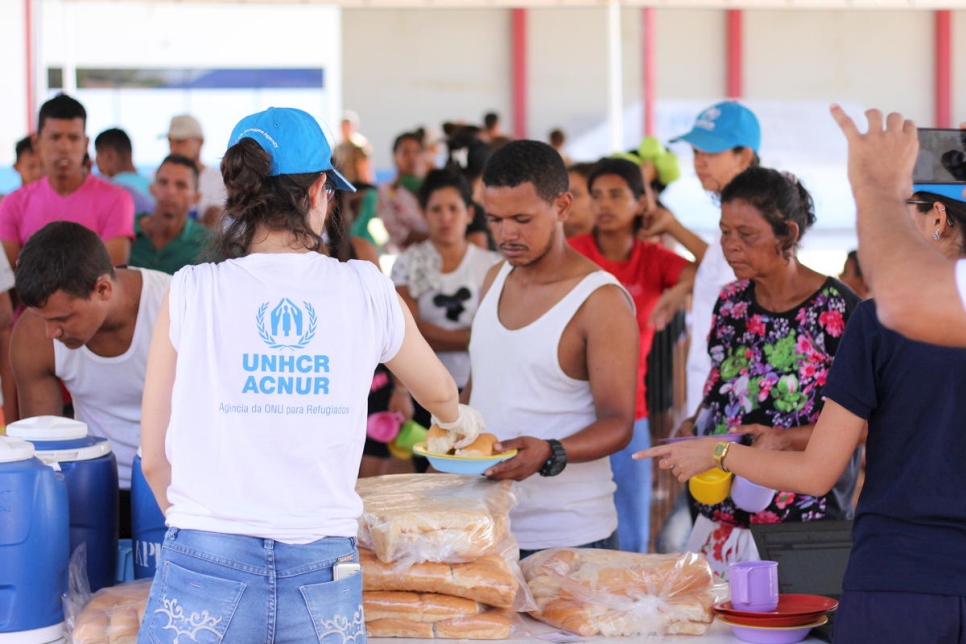Venezuela situation
“We left everything in Venezuela. We don’t have a place to live or sleep and have nothing to eat.”
–Nayebis Carolina Figuera, a 34-year-old from Venezuela who fled to neighbouring Brazil
Venezuela has traditionally hosted thousands of refugees from the region and other parts of the world. Now the number of people from Venezuela compelled to leave their homes continues to increase, and a significant number of them are in need of international protection. Some 4 million Venezuelans have left their country to date – according to data from governments receiving them– making this among the world’s biggest recent displacement crises.
There has been a 4,000 per cent increase in the number of Venezuelans seeking refugee status worldwide since 2014, principally in the Americas. Many Venezuelans who would meet the criteria are not registering for refugee procedures, and are instead opting for alternative legal forms of stay, which are easier and faster to obtain and allow access to work, education and social services. Among them, there are also people in need of international refugee protection.
However, hundreds of thousands of Venezuelans remain without any documentation or permission to stay regularly in nearby countries, and therefore lack guaranteed access to basic rights. This makes them particularly vulnerable to labour and sexual exploitation, trafficking, violence, discrimination and xenophobia.
The majority of Venezuelans arriving in neighbouring countries are families with children, pregnant women, elderly people and people with disabilities. Often obliged to take irregular routes to reach safety, they fall prey to smugglers, traffickers and irregular armed groups. As more and more families arrive with fewer and fewer resources, they are in immediate need of protection, shelter, food and medicine.
Host countries and communities in Brazil, Colombia, Costa Rica, Ecuador, Mexico, Panama, Peru and the southern Caribbean have been generously welcoming them, but are increasingly overstretched and some are reaching a saturation point.
“We walked for 11 days and had to sleep outside. We left because they threatened to kill us. My brother was killed… They almost killed me.”
–Ana, Venezuelan woman in Ecuador
What is UNHCR doing to help?
Throughout the region, UNHCR has stepped up its response and is closely working with host governments and partners, particularly IOM, to support a coordinated and comprehensive approach to the needs of refugees and migrants from Venezuela. Concretely, we are collecting data to better understand the specific needs of Venezuelans; supporting States to improve reception conditions, coordinate the provision of information and assistance to meet Venezuelans’ immediate basic needs including shelter; and combating discrimination and xenophobia through awareness campaigns.
Notably, we have strengthened our presence along key borders to limit to the extent possible risks, in particular with regards to access to territory, trafficking, exploitation as well as identifying people who may require dedicated protection and services, such as unaccompanied and separated children and pregnant women. UNHCR also provides support and legal orientation on arrival and distributes drinkable water, children kits and dignity kits for women at border areas. Our teams also provide cash assistance to the most vulnerable Venezuelans.
In Colombia, UNHCR has supported the government’s administrative registration of over 1.3 million Venezuelans present in the country with irregular status, to better address their needs and regularize their stay. UNHCR is also supporting government’s registration efforts in Peru and Brazil. In Peru, asylum requests from Venezuelans experienced a more than five-fold increase, going from 33,100 in 2017 to 190,500 in 2018. 61,600 asylum claims were submitted in Brazil, an increase from the 17,900 reported in 2017.
In Brazil, UNHCR complements the government’s efforts to provide shelter for Venezuelans arriving in the border states of Roraima and Amazonas. We are providing site planning, tents, relief items, drinking fountains, registration through biometrics, community mobilization, information dissemination and site management. So far, 13 temporary shelters have opened in Boa Vista and Pacaraima, hosting over 6,000 Venezuelans. UNHCR is also supporting the relocation of refugees and migrants from Venezuela from Roraima to other parts of Brazil with wider employment opportunities and services.
“It took us over seven days to reach Peru. We had nothing to eat at the end. We tried to spare all for our son, but he also went over 24 hours without a bite. He is only three.”
Gerardo, Venezuelan father in Peru
In an effort to curb xenophobia against Venezuelans and promote solidarity, UNHCR has launched four campaigns in Colombia, Peru, Panama and Costa Rica. Other countries in the region, notably Brazil, Ecuador and Trinidad and Tobago, are launching similar initiatives in 2019.
A scale-up of humanitarian assistance, as well as increased support to socio-economic inclusion mechanisms, is urgently required to complement government efforts and to ensure communities continue to accept refugees and migrants in a safe and welcoming environment. The Regional Refugee and Migrant Response Plan, developed with some 95 partners, aims to prioritize the needs of over 2.6 million refugees and migrants from Venezuela as well as an estimated half a million host community members.
As part of this Plan, UNHCR requires an initial US$134 million in 2019 to continue responding to the most urgent needs of refugees and migrants from Venezuela in 16 host countries most affected by this situation.
Reports and Links
- Regional Refugee and Migrant Response Plan for Refugees and Migrants from Venezuela (January–December 2019)
- Emergency plan for refugees and migrants from Venezuela launched (14 December 2018)
- Number of refugees and migrants from Venezuela reaches 3 million (8 November 2018)
- UNHCR and IOM chiefs call for more support as the outflow of Venezuelans rises across the region (23 August 2018)
- UNHCR ramps up response as Ecuador declares emergency (10 August 2018)
- Hunger, despair drive indigenous groups to leave Venezuela (7 August 2018)
- UNHCR Guidance Note on the Outflow of Venezuelans

